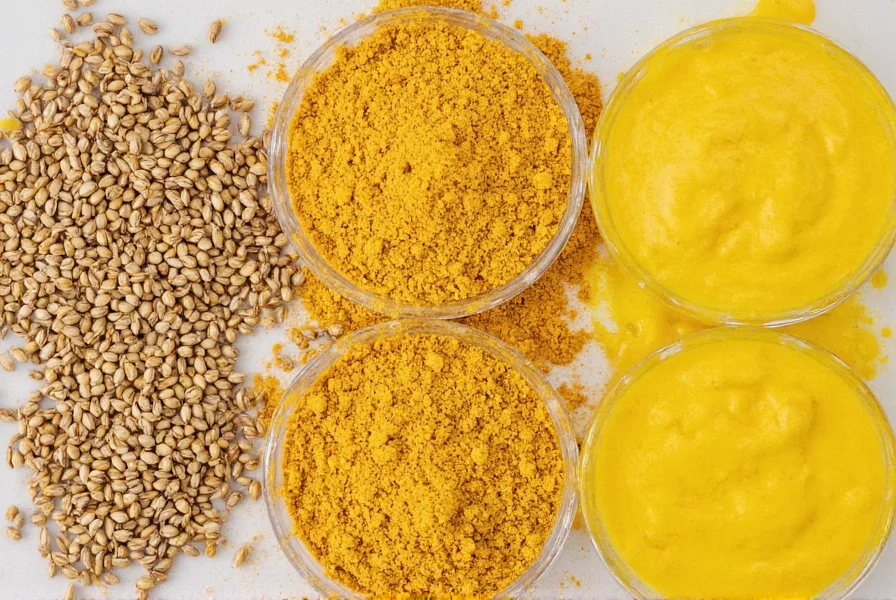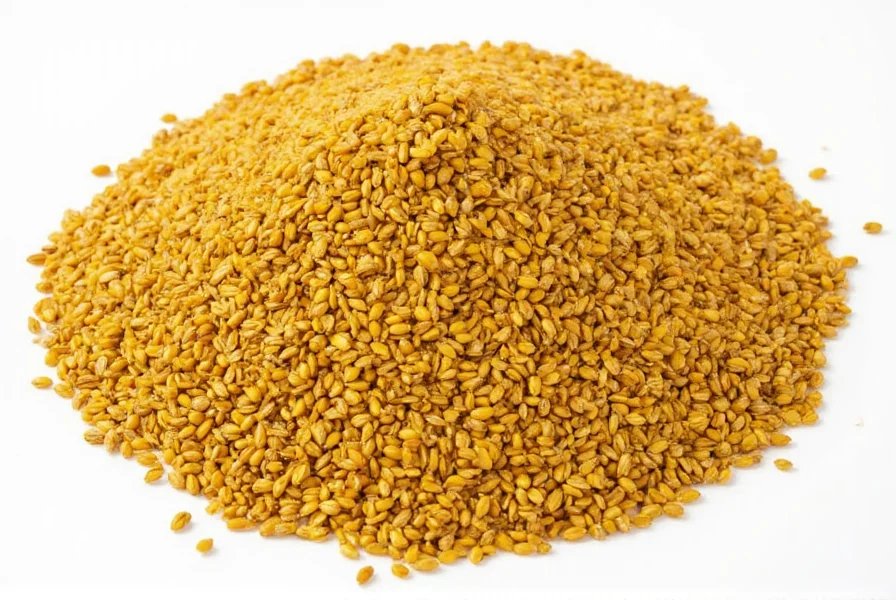Running out of mustard seeds mid-recipe doesn't have to ruin your cooking plans. Whether you're making pickles, curries, or homemade mustard, several accessible alternatives can save your dish while maintaining similar flavor profiles and functionality. Understanding which substitute works best for your specific culinary application ensures your recipe turns out perfectly.
Why Mustard Seeds Matter in Cooking
Mustard seeds—whether yellow, brown, or black—provide distinctive pungency, texture, and flavor complexity to dishes. When heated in oil (tempered), they release essential oils that create a nutty aroma fundamental to many Indian, Middle Eastern, and European cuisines. Their unique chemical composition, containing sinigrin and myrosinase enzymes, produces that characteristic sharpness when crushed or chewed.
Top 5 Mustard Seed Substitutes Ranked by Effectiveness

1. Prepared Mustard (Best for Wet Applications)
Use 1 tablespoon of prepared yellow mustard for every teaspoon of mustard seeds. This substitute works exceptionally well in salad dressings, marinades, and sandwich spreads where moisture content matters. The vinegar and liquid components in prepared mustard mimic the chemical reaction that occurs when mustard seeds are hydrated. For canning and pickling recipes requiring the antimicrobial properties of mustard, prepared mustard provides similar preservation benefits.
2. Mustard Powder (Best Dry Replacement)
Substitute 1 teaspoon of mustard powder for each teaspoon of mustard seeds. Mustard powder reconstitutes to create that familiar sharp flavor when mixed with liquid. For recipes requiring whole seeds (like tempering in Indian cooking), mix the powder with 1 teaspoon of water or vinegar and let it sit for 10 minutes to activate the enzymes before adding to your dish. This conversion guide shows precise measurements for different applications.
3. Horseradish (For Pungent Heat)
Use 1–2 teaspoons of prepared horseradish per teaspoon of mustard seeds when you need that sinus-clearing heat. While horseradish lacks the nuttiness of mustard seeds, it provides similar pungency through different chemical compounds (allyl isothiocyanate instead of sinigrin). Best used in Bloody Mary mixes, cocktail sauces, and robust meat dishes where the distinct mustard flavor isn't essential.
4. Wasabi Paste (Japanese Cuisine Alternative)
Substitute 1–1.5 teaspoons of wasabi paste for each teaspoon of mustard seeds in sushi preparations or Asian-inspired dishes. Real wasabi (not the common horseradish-based substitute) offers a cleaner, more floral heat that can complement dishes where mustard seeds would normally provide background warmth without overwhelming other flavors.
5. Turmeric + Vinegar Combo (Color and Tang)
For recipes where mustard seeds primarily contribute color (like pickles), combine 1–2 teaspoons of turmeric with 1 tablespoon of vinegar or lemon juice per teaspoon of mustard seeds. This substitute won't replicate the flavor but maintains visual appeal and acidity. Add a pinch of cumin for depth in spice-heavy dishes like curries.
| Recipe Type | Best Substitute | Conversion Ratio | Special Instructions |
|---|---|---|---|
| Pickling/Preserving | Prepared mustard | 1 tbsp per tsp seeds | Add during brine preparation for proper preservation |
| Indian tempering (tadka) | Mustard powder + water | 1 tsp powder + 1 tsp water | Mix and wait 10 minutes before heating in oil |
| Salad dressings | Prepared Dijon mustard | 1 tbsp per tsp seeds | Add at end of preparation to preserve sharpness |
| Dry rubs | Mustard powder | 1:1 replacement | Mix with other dry spices 1 hour before use |
| Homemade mustard | Mustard powder | 3:1 powder to liquid | Soak powder in vinegar for 12+ hours before blending |
When to Choose Specific Mustard Seed Alternatives
Understanding your recipe's requirements helps select the optimal substitute. For mustard seed replacement for canning, prepared mustard provides necessary acidity and antimicrobial properties. When making mustard seed alternative for Indian cuisine, mustard powder reconstituted with water best mimics the tempering process. For those with mustard allergies seeking non-allergenic mustard seed alternatives, horseradish or wasabi (check for mustard contamination) may work depending on allergy severity.
Chefs developing homemade mustard seed substitute blends often combine 2 parts mustard powder with 1 part turmeric and a pinch of fenugreek for complex flavor. This mixture works particularly well as a substitute for yellow mustard seeds in American-style recipes where milder flavor is preferred.
Common Substitution Mistakes to Avoid
Many home cooks make critical errors when replacing mustard seeds. Don't add mustard powder directly to hot oil—it will burn and become bitter. Avoid using wasabi powder instead of paste, as the flavor profile differs significantly. When substituting in mustard seed replacement for cooking applications requiring whole seeds for texture (like sauerkraut), consider adding a few poppy seeds for visual similarity, though they won't provide flavor equivalence.
For best substitute for mustard seed in pickling, remember that prepared mustard contains additional ingredients like sugar and spices that may alter your brine's flavor profile. Opt for plain yellow mustard without added flavors for most pickling applications.
Creating Balanced Flavor Profiles Without Mustard Seeds
When substituting, consider the four elements mustard seeds contribute: heat, tang, nuttiness, and visual texture. Prepared mustard delivers tang and heat but lacks nuttiness. Mustard powder provides heat and some nuttiness when properly hydrated. To create a more complete substitute, try this professional chef's blend:
- 1 teaspoon mustard powder
- 1–2 teaspoons vinegar or lemon juice
- 1–2 pinches of ground fenugreek (for nuttiness)
- Small pinch of turmeric (for color)
Mix these ingredients and let them sit for 10–15 minutes before incorporating into your recipe. This combination works exceptionally well as a mustard powder vs mustard seeds conversion solution for most applications.
Frequently Asked Questions
Can I use mustard powder instead of mustard seeds in pickling?
Yes, use 1 teaspoon of mustard powder mixed with 1 teaspoon of water for every teaspoon of mustard seeds. Let the mixture sit for 10 minutes to activate before adding to your pickling brine. This provides similar antimicrobial properties and flavor, though the visual texture will differ since you won't have whole seeds in your finished product.
What's the best substitute for mustard seeds in Indian cooking?
For Indian recipes requiring tempering (tadka), reconstituted mustard powder works best. Mix 1 teaspoon mustard powder with 1 teaspoon water and let it sit for 10 minutes before heating in oil. This mimics the chemical reaction that occurs when whole mustard seeds pop in hot oil. For recipes like Bengali shorshe ilish (mustard fish), use prepared mustard blended with a small amount of water to achieve the proper consistency.
How do I substitute mustard seeds in a dry rub?
For dry rubs, use an equal amount of mustard powder as a direct substitute. For better flavor development, mix the mustard powder with the other dry ingredients and let the rub rest for at least one hour before applying to meat. This allows the mustard compounds to hydrate slightly from ambient moisture, creating a more complex flavor profile similar to what whole mustard seeds would provide when toasted.
Can I replace mustard seeds with horseradish in salad dressing?
Yes, but with adjustments. Use 1–2 teaspoons of prepared horseradish per teaspoon of mustard seeds, and add an extra teaspoon of vinegar or lemon juice to compensate for the missing tang. Horseradish provides similar pungency but lacks the nutty undertones of mustard. For best results in salad dressings, combine horseradish with a small amount of tahini or ground sesame seeds to approximate mustard's nuttiness.
What's a good non-allergenic substitute for mustard seeds?
For those with mustard allergies, consider a combination of turmeric (for color), apple cider vinegar (for tang), and a small amount of ground fenugreek (for nuttiness). Wasabi may be an option if the allergy is specific to mustard plants (Brassicaceae family), but consult with an allergist first as cross-reactivity can occur. Horseradish-based substitutes should be avoided as they often contain mustard derivatives in commercial preparations.











 浙公网安备
33010002000092号
浙公网安备
33010002000092号 浙B2-20120091-4
浙B2-20120091-4